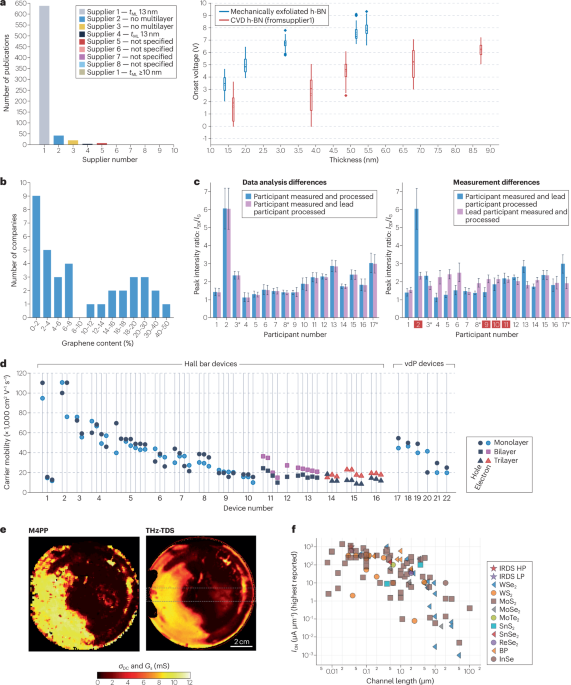Begley, C. G. & Ellis, L. M. Raise standards for preclinical cancer research. Nature 483, 531–533 (2012).
Errington, T. M., Denis, A., Perfito, N., Iorns, E. & Nosek, B. A. Reproducibility in cancer biology: challenges for assessing replicability in preclinical cancer biology. eLife 10, e67995 (2021).
Baker, M. 1,500 scientists lift the lid on reproducibility. Nature 533, 452–454 (2016).
Munafò, M. R. et al. A manifesto for reproducible science. Nat. Hum. Behav. 1, 0021 (2017).
Baker, M. & Dolgin, E. Cancer reproducibility project releases first results. Nature 541, 269 (2017).
Johansson, P. et al. Ten ways to fool the masses when presenting battery research. Batteries Supercaps 4, 1785–1788 (2021).
Boggild, P. Research on scalable graphene faces a reproducibility gap. Nat. Commun. 14, 1126 (2023).
Lanza, M., Smets, Q., Huyghebaert, C. & Li, L. J. Yield, variability, reliability, and stability of two-dimensional materials based solid-state electronic devices. Nat. Commun. 11, 5689 (2020).
Kauling, A. P. et al. The worldwide graphene flake production. Adv. Mater. 30, 1803784 (2018).
Chatterjee, S., Abadie, T., Wang, M. H., Matar, O. K. & Ruoff, R. S. Repeatability and reproducibility in the chemical vapor deposition of 2D films: a physics-driven exploration of the reactor black box. Chem. Mater. 36, 1290–1298 (2024).
Amontree, J. et al. Reproducible graphene synthesis by oxygen-free chemical vapour deposition. Nature 630, 636–642 (2024).
Guo, W., Wu, B., Wang, S. & Liu, Y. Q. Controlling fundamental fluctuations for reproducible growth of large single-crystal graphene. ACS Nano 12, 1778–1784 (2018).
Turner, P. et al. International interlaboratory comparison of Raman spectroscopic analysis of CVD-grown graphene. 2D Mater. 9, 035010 (2022).
Mackenzie, D. M. A. et al. Quality assessment of terahertz time-domain spectroscopy transmission and reflection modes for graphene conductivity mapping. Opt. Express 26, 9220–9229 (2018).
Fan, Y. et al. Recent advances in growth of large-sized 2D single crystals on Cu substrates. Adv. Mater. 33, e2003956 (2021).
Wittmann, S. et al. Assessment of wafer-level transfer techniques of graphene with respect to semiconductor industry requirements. Adv. Mater. Technol. 8, 2201587 (2023).
Cheng, Z. H. et al. How to report and benchmark emerging field-effect transistors. Nat. Electron. 5, 416–423 (2022).
Cheng, Z. H. et al. How to report and benchmark emerging field-effect transistors. Nat. Electron. 5, 620–620 (2022).
McClellan, C. J. et al. 2D Device Trends (Stanford, accessed 17 April 2025); http://2d.stanford.edu/2D_Trends.html.
Díez-Mérida, J. et al. High-yield fabrication of bubble-free magic-angle twisted bilayer graphene devices with high twist angle homogeneity. Newton 1, 100007 (2025).
Canto, B. et al. Multi-project wafer runs for electronic graphene devices in the European 2D-experimental pilot line project. Nat. Commun. 16, 1417 (2025).
Nosek, B. et al. Reproducibility and transparency: what’s going on and how can we help. Nat. Commun. 16, 1082 (2025).
Munafò, M. Raising research quality will require collective action. Nature 576, 183–183 (2019).
Kent, B. A. et al. Recommendations for empowering early career researchers to improve research culture and practice. PLoS Biol. 20, e3001680 (2022).
Higginson, A. D. & Munafò, M. R. Current incentives for scientists lead to underpowered studies with erroneous conclusions. PLoS Biol. 14, e2000995 (2016).
Gammelgaard, L., Whelan, P. R., Booth, T. J. & Boggild, P. Long-term stability and tree-ring oxidation of WSe2 using phase-contrast AFM. Nanoscale 13, 19238–19246 (2021).
Johann, D., Neufeld, J., Thomas, K., Rathmann, J. & Rauhut, H. The impact of researchers’ perceived pressure on their publication strategies. Res. Eval. https://doi.org/10.1093/reseval/rvae011 (2024).
Smith, A. Who discovered the magnetocaloric effect? Eur. Phys. J. H. 38, 507–517 (2013).
Lau, C. N., Bockrath, M. W., Mak, K. F. & Zhang, F. Reproducibility in the fabrication and physics of moire materials. Nature 602, 41–50 (2022).
Kapfer, M. et al. Programming twist angle and strain profiles in 2D materials. Science 381, 677–681 (2023).
Knoepfler, P. Reviewing post-publication peer review. Trends Genet. 31, 221–223 (2015).
Dance, A. Stop the peer-review treadmill. I want to get off. Nature 614, 581–583 (2023).
Woolston, C. Workplace habits: full-time is full enough. Nature 546, 175–177 (2017).
Promoting reproducibility with registered reports. Nat. Hum. Behav. 1, 0034 (2017).
Wilkinson, M. D. et al. The FAIR Guiding Principles for scientific data management and stewardship. Sci. Data 3, 160018 (2016).
Clifford, C. A. et al. The importance of international standards for the graphene community. Nat. Rev. Phys. 3, 233–235 (2021).
The Danish Code of Conduct for Research Integrity. https://ufm.dk/en/publications/2014/the-danish-code-of-conduct-for-research-integrity (accessed 6 June 2025). The European Code of Conduct for Research Integrity. https://ec.europa.eu/info/funding-tenders/opportunities/docs/2021-2027/horizon/guidance/european-code-of-conduct-for-research-integrity_horizon_en.pdf (accessed 6 June 2025).
Go forth and replicate! Nature 536, 373 (2016).
Begley, C. G., Buchan, A. M. & Dirnagl, U. Robust research institutions must do their part for reproducibility. Nature 525, 25–27 (2015).
Shiffrin, R. M., Börner, K. & Stigler, S. M. Scientific progress despite irreproducibility: a seeming paradox. Proc. Natl Acad. Sci. USA 115, 2632–2639 (2018).
Yuan, Y. et al. On the quality of commercial chemical vapour deposited hexagonal boron nitride. Nat. Commun. 15, 4518 (2024).
Pizzocchero, F. et al. The hot pick-up technique for batch assembly of van der Waals heterostructures. Nat. Commun. 7, 11894 (2016).
Whelan, P. R. et al. Electrical homogeneity mapping of epitaxial graphene on silicon carbide. ACS Appl. Mater. Interfaces 10, 31641–31647 (2018).
Consort 2010. Lancet 375, 1136 (2010).
von Elm, E. et al. The strengthening the reporting of observational studies in epidemiology (STROBE) statement: guidelines for reporting observational studies. Lancet 370, 1453–1457 (2007).
